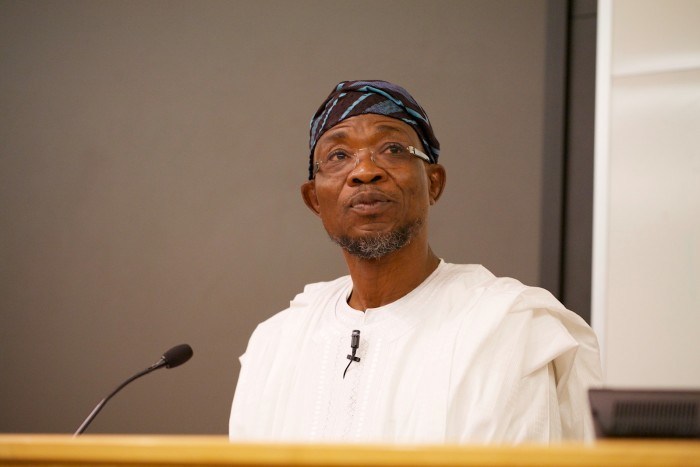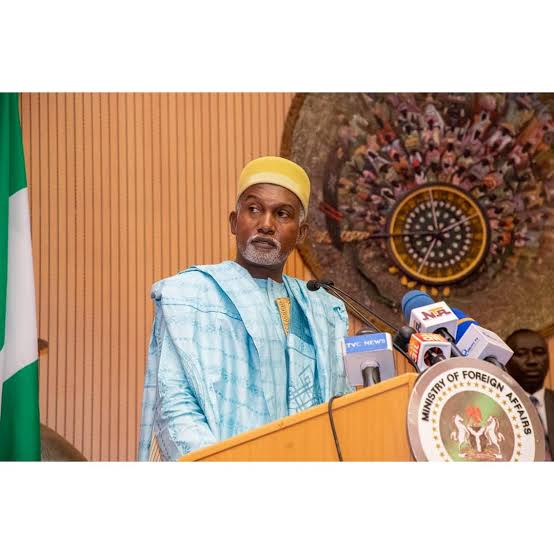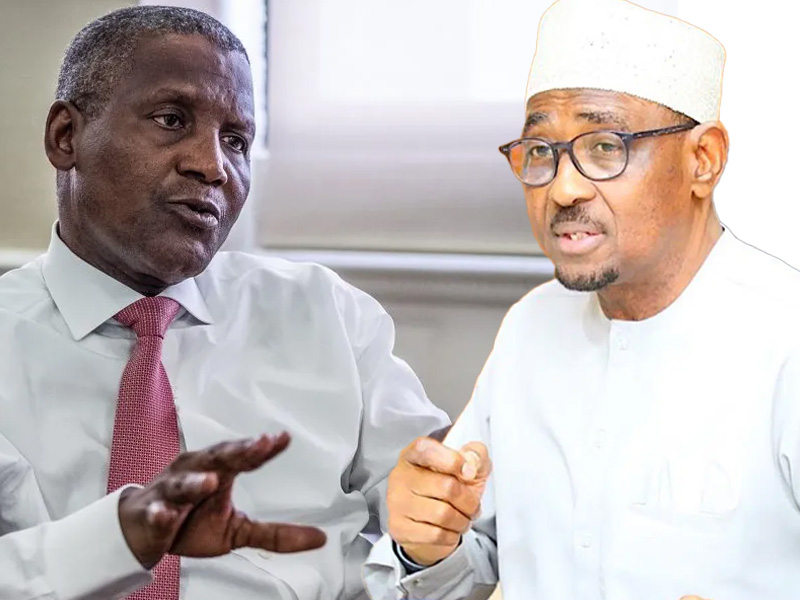Ogbeni Aregbesola: Political Popularity Has A Limit
BY ABIMBOLA TOOKI

In politics, popularity is often regarded as the golden ticket to relevance, influence, and survival. Yet, when stripped down to its core, popularity in political parlance is nothing more than the perception of acceptability by the people; a combination of trust, admiration, loyalty, and shared aspirations between the leader and the led. But history has shown repeatedly that popularity is fragile; it is never absolute, and it is never infinite. It comes with boundaries and conditions that, if ignored, can swiftly turn admiration into rejection.
This context becomes crucial when assessing the political trajectory of Ogbeni Rauf Aregbesola, former governor of Osun State and one-time strongman of the progressives. Many observers and admirers alike still speak of his supposed political popularity.
But a critical question arises: is Aregbesola’s political acceptance organic, born purely out of his personal charisma and achievements, or is it a manifestation of his long-standing association with his political godfather, President Bola Ahmed Tinubu?
I hold an immense amount of respect for Ogbeni Rauf Aregbesola. Over the years, I have been privileged to share several personal encounters with him, particularly during his tenure as the governor of Osun State. Those moments gave me a closer understanding of his personality and convictions.
Aregbesola is, without doubt, a fighter. He does not shy away from challenges, and he confronts issues with uncommon courage and determination. Once he is convinced about a cause, he pursues it with remarkable energy, focus, and unwavering vigour.
This resilience has always been one of his defining strengths and a key reason he remains an influential figure in Nigerian politics.
He is also a man who commands affection. His charisma and simplicity make him loved by many across social, political, and religious divides.
For those who have enjoyed his friendship or loyalty, Aregbesola is a dependable ally. When he stands with you, he does so wholeheartedly. He can go to any length, even laying down his comfort to protect and defend those he believes in.
These qualities, his courage, conviction, loyalty, and capacity to inspire, explain why he continues to be a figure of admiration and relevance, both within Osun State and on the national stage.
The Roots of His Popularity
It would, however, be difficult, if not dishonest, to detach Aregbesola’s rise from Tinubu’s towering influence. Without Tinubu’s political mentorship, financial backing, and strategic guidance, would Aregbesola have ever ascended to the governorship seat in Osun State?
Aregbesola’s career was clothed in Tinubu’s influence. It was the godfather’s resources, structures, and networks that paved the way.
The popularity Aregbesola enjoyed during his governorship years was less about his independent strength and more about the institutional might of the Tinubu political family. This is not to diminish his personal contributions or grassroots touch, but context demands honesty: the branches flourished because they were grafted onto a powerful tree.
Popularity and Its Boundaries
The Yoruba, like many other politically conscious groups, place great value on loyalty, history, and collective identity. Their political memory stretches back decades from the days of Chief Obafemi Awolowo, to MKO Abiola, down to the contemporary influence of Tinubu. This political consciousness creates red lines that no individual, however popular, is permitted to cross.
Therefore, there is absolutely no scenario where Ogbeni Rauf Aregbesola can mount any podium in Yorubaland and openly urge the Yoruba electorate to abandon President Bola Ahmed Tinubu for Atiku Abubakar or any other adversary without grave consequences. Such a move would be seen not merely as a political miscalculation but as a betrayal of Yoruba solidarity and pride.
The backlash in such an instance would be spontaneous, not requiring sponsorship, manipulation, or external incitement. The Yoruba people, deeply protective of their political icons, would rise fiercely against any attempt to undermine Tinubu in his own political stronghold. The rejection would be swift, widespread, and unforgiving.
Lessons from Political History
Political history is replete with examples of once-beloved figures who miscalculated the limits of their popularity.
In Nigeria, leaders like Chief Olusegun Obasanjo have learned that influence wanes when it collides with entrenched loyalties. Across the world, from Margaret Thatcher in the UK to Jacob Zuma in South Africa, popularity has crumbled once leaders misjudged the people’s boundaries.
The same lesson applies to Aregbesola. His admirers may chant his name in local gatherings, but admiration has its ceiling. Once it trespasses into areas that challenge Yoruba political identity and cultural loyalty, it is no longer popularity. It becomes provocation.
Ogbeni Rauf Aregbesola, once celebrated as one of the brightest stars in the progressive family, has, unfortunately, found himself entangled in this cultural miscalculation. His repeated verbal attacks and subtle betrayals of his political benefactor are not just political errors but grave affronts to Yoruba sensibilities.
A History of Verbal Strikes Against His Benefactor
Over the years, Aregbesola has been accused, rightly, many Yoruba elders insist, of abusing Tinubu both in words and in deeds.
From subtle insinuations at public rallies to outright condemnations in private gatherings that later leaked, his utterances have painted the picture of a protégé eager to sever the umbilical cord from his mentor by force rather than maturity.
So frequently, have these instances become that a saying now trails him: “Anywhere Aregbesola mounts the podium with drummers behind him, he must abuse Tinubu.” This is not just hyperbole; it has become a common sight at his public appearances. The cadence of the drums, the applause of supporters, and the intoxication of the crowd often seem to trigger in him the urge to take swipes at the very man who nurtured his political career from obscurity to prominence.
Deeds That Spoke Louder Than Words
But beyond words, Aregbesola’s deeds also reflected a deep-seated animosity towards Tinubu. His political manoeuvres in Osun State, particularly his role in orchestrating intra-party crises and supporting factions against Tinubu’s loyalists, were read by many as open rebellion.
For instance, his tacit and, at times, open support for political structures opposed to Tinubu’s chosen successors in Osun betrayed a level of defiance that stunned Yoruba elders. To them, it was akin to a son not only insulting his father in public but also working actively to diminish his father’s authority in the extended family.
Yoruba Elders’ Verdict: A Step Too Far
The Yoruba values loyalty above all else in political relationships. Aregbesola’s repeated attacks on Tinubu have, therefore, not been interpreted as mere intra-party squabbles but as sacrilege against the unwritten code of Yoruba political morality.
Many Yoruba elders have openly declared that Aregbesola overstepped his boundaries. To them, this was not simply politics; it was a matter of values. They argue that no amount of political ambition, personal grievance, or generational difference can justify dragging an elder, much less one’s benefactor, into the mud.
The proverb captures this perfectly: “Ọmọde bá ní ká gbọ́, kò gbọ́; ó bá ní ká rí, kò rí; bó bá tó ayé, ayé á fi hàn án.” (When a child refuses to heed advice or to see wisdom, life itself will teach him with hard lessons.)
Tinubu’s Silence: The Ultimate Power Play
Perhaps the most remarkable aspect of this saga is Tinubu’s consistent silence. Despite Aregbesola’s repeated verbal attacks and rebellious actions, President Bola Ahmed Tinubu has not once engaged him directly in public altercations.
This silence is not weakness; it is strategy. In Yoruba culture, when an elder refuses to respond to insults from a younger one, it is a demonstration of superior wisdom and restraint. The elder knows that time, circumstances, and the people themselves will vindicate him. By saying nothing, Tinubu has, in fact, said everything. He has placed Aregbesola before the court of Yoruba conscience, where the verdict is already damning. The people have judged, and the judgment is that Aregbesola abused the privilege of popularity and forgot the source of his rise.
Consequences of Miscalculation
The political consequences of this miscalculation are already evident. Aregbesola’s once-formidable influence has waned. His attempts to position himself as a parallel force within the progressive family have faltered. His grassroots base is now fractured, and his political image, once burnished by loyalty and discipline, now suffers from the stain of betrayal. The recent bye election results is clear evidence.
In Yoruba land, no amount of oratory brilliance or grassroots charm can erase the stigma of disrespecting a benefactor. The people may clap at rallies, but in the silent corners of their hearts, they shake their heads at the arrogance of a protégé turned aggressor.
A Word of Caution
Ogbeni Aregbesola must be cautioned against overstretching the boundaries of his political influence. It is one thing to nurse personal grievances or political ambitions; it is another to weaponize such ambitions against a leader like Tinubu, who embodies Yoruba pride in contemporary politics.
In essence, Aregbesola must understand that Yoruba politics has sacred red lines. Not even the most ardent admirers can shield him if he crosses them. Popularity may protect a man within his circle, but when it confronts the collective pride of a people, it quickly turns into vulnerability.
Ogbeni Aregbesola should reflect deeply on the nature of political popularity. It is not infinite; it is not indestructible. It has boundaries defined by history, loyalty, and cultural pride. He must remember that his own rise was made possible by the very structures and loyalties he risks undermining.
The Yoruba do not forget easily, and they do not forgive lightly when it comes to respect for elders and benefactors. Aregbesola’s political miscalculations stand as a cautionary tale: no matter how high a protégé rises, he must never burn the bridge that carried him there.
For Aregbesola, the message is clear: political popularity has a limit, and wisdom lies in knowing when not to test it.
Tooki is an editor/founder, communication strategist and public relations expert
Categorised as : Opinion
No Comments »
Related posts













